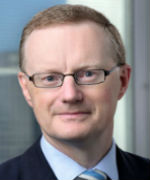The Reserve Bank governor has signaled the solid performance of the labor market is allowing policy makers to extend an interest-rate pause

RBA's Lowe signals steady labor market allows pause on cash rate
(Bloomberg) -- Reserve Bank of Australia Governor Philip Lowe signaled the solid performance of his nation’s labor market is allowing policy makers to extend an interest-rate pause.
“All else constant, if the unemployment rate is high and rising, the stronger would be the case for policy to pursue a quicker return of inflation to the midpoint of the target,” Lowe said in the text of a speech in Sydney Wednesday. “To date, we have been satisfied that the labor market is heading in the right direction, if not as quickly as we’d like.”
Australia’s unemployment rate has hovered between 5.6 percent and 6 percent for the past year as the strength of the nation’s east coast property market and infrastructure spending outweighed an unwinding of mining investment in the west and north. The RBA cut rates twice last year; since taking the helm in September, Lowe has signaled a willingness to tolerate weaker CPI to avoid households taking on more debt than current record levels.
The governor signaled his staff have been war-gaming potential outcomes: “In our risk management exercises, we have been seeking to balance the risks from having inflation low for a longer period against the risks from attempting to increase inflation more quickly, which would partly occur through encouraging more borrowing.”
Debt Warning
But Lowe warned that rising debt from an already record-low cash rate of 1.5 percent could stretch household finances too far.
“If so, then at some point in the future, households having decided that they had borrowed too much, might cut back consumption sharply, hurting the overall economy and employment,” Lowe said. “It is difficult to quantify this risk, but it is one that is difficult to ignore. As I said, our focus is on the medium term, not just the next year or so.”
(Bloomberg) -- Reserve Bank of Australia Governor Philip Lowe signaled the solid performance of his nation’s labor market is allowing policy makers to extend an interest-rate pause.
“All else constant, if the unemployment rate is high and rising, the stronger would be the case for policy to pursue a quicker return of inflation to the midpoint of the target,” Lowe said in the text of a speech in Sydney Wednesday. “To date, we have been satisfied that the labor market is heading in the right direction, if not as quickly as we’d like.”
Australia’s unemployment rate has hovered between 5.6 percent and 6 percent for the past year as the strength of the nation’s east coast property market and infrastructure spending outweighed an unwinding of mining investment in the west and north. The RBA cut rates twice last year; since taking the helm in September, Lowe has signaled a willingness to tolerate weaker CPI to avoid households taking on more debt than current record levels.
The governor signaled his staff have been war-gaming potential outcomes: “In our risk management exercises, we have been seeking to balance the risks from having inflation low for a longer period against the risks from attempting to increase inflation more quickly, which would partly occur through encouraging more borrowing.”
Debt Warning
But Lowe warned that rising debt from an already record-low cash rate of 1.5 percent could stretch household finances too far.
“If so, then at some point in the future, households having decided that they had borrowed too much, might cut back consumption sharply, hurting the overall economy and employment,” Lowe said. “It is difficult to quantify this risk, but it is one that is difficult to ignore. As I said, our focus is on the medium term, not just the next year or so.”



